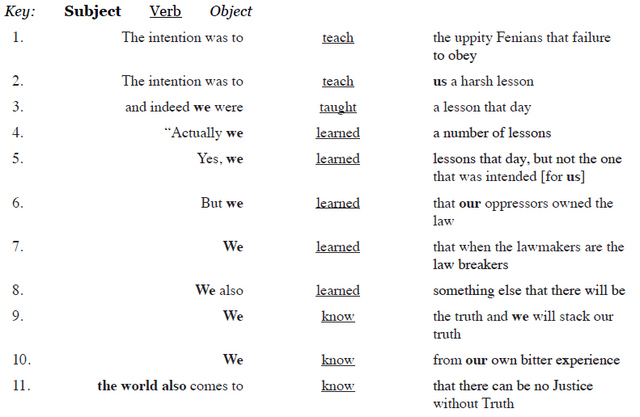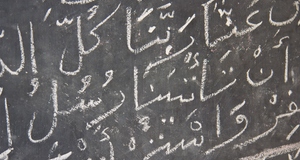From Clocks and Clouds VOL. 7 NO. 1"Solidarity of 'the Colonized'": A Critical Discourse Analysis of Sinn Féin's Connection To PalestineDe-legitimizing Violence: A Progression of Identity and MoralitySinn Féin continues its reaffirmation of the Irish struggle for independence through delegitimizing violence committed by Britain and its parallel, Israel. The dehumanizing and devaluing of "colonizer" state identities provides an ideal foundation for Sinn Féin to delegitimize violence committed by the state against the moral "colonized" peoples. This negotiation of legitimacy allows Sinn Féin to challenge the de-legitimization of the IRA in the Good Friday Agreement and reaffirm the struggle for Irish political sovereignty. Through high epistemic modality, Sinn Féin's speeches delegitimize British and Israeli violence with verb choice and valuation. The speeches repeat the verbs "murder" and "attack," to describe the actions of British and Israeli troops on Irish and Palestinian people. Both "murder" and "attack" are offensive verbs, with an implied perpetrator and victim. Instead of using a synonym with flexible epistemic modality like the passive "died" or "lost," Sinn Féin demonstrates high epistemic modality commitment to the notion of actor-onto-object violence. This modality choice indicates absolute conviction in the illegitimacy of violence committed by colonial states and removes flexibility from interpretation by Sinn Féin or its audience. Sinn Féin further undermines the legitimacy of the "colonizer" state by applying a non-dominant definition of terrorism to Britain and Israel.
First, in lines 1 and 2, Sinn Féin spokesman, Conor Murphy, references the abstract social event of Irish suffering under British rule, and denotes it as "terror." The use of the word terror defies the Western hegemonic definition that excludes state actors as perpetrators of terrorism. By challenging the accepted norm of "colonizer" states with the word "terror," Sinn Féin undermines the authority and legitimacy of these states. Second, in lines 3 and 4, the speaker highlights the irony of a democratic state killing innocent "friends and neighbours" as counterterrorism. This text connects two clauses with "on the same spurious grounds," thus making the information equal. Referring back to Sinn Féin's moral identity construction, this first clause in line 1 implies that killing "our friends and neighbors," is immoral. On the opposite side of the connector, "defending democracy from terrorism," also becomes immoral. In this text, Sinn Féin challenges the Weber-esque legitimizing of state violence against a people by ascribing it negative, immoral value.
Finally, the grammatical devices in lines 5 and 6 display Sinn Féin's inability to separate its solidarity with Palestine from its own struggle for independence as it seeks to delegitimize violence deployed by "colonizer" states. In line 5, the speaker implores the international community to protect Palestine and its people. But in line 6, the speaker shifts subjects from the Palestinians to "the occupiers" and the object "the occupied." This immediate change from the specific "Palestinians" to generalized nouns indicates a broader scope for this statement. Sinn Féin again emphasizes the identity dichotomy of the world as "colonizers" and "colonized:" "occupiers" and "occupied." The shift away from the specific proper noun "Palestinians" toward the general nouns alludes to the Irish conflict with the British, in which the British "occupiers" failed to protect the Irish "occupied." This relationship constructed by Sinn Féin obligates them to show solidarity with Palestine and reinforces the morality of their identities in contrast with their oppressors. Agency in Sinn Féin DiscourseSinn Féin achieves agency through two key examples from the speeches analyzed. Below, I collocate the repetition of the cognitive verbs "teach," "learn" and "know" in order of appearance in the text. In lines 1 and 2, the implied subject of the "teaching" is Britain.1 The speaker relays the idiom of "teaching a lesson"—punishing or disciplining an unfavorable act, often one of a child. This idiom places Britain in the power position of the punisher, or the teacher of the lesson to the disobedient Irish. However, the speaker's subsequent repetition of the "teach/learn/know" verb corrupts the meaning of the idiom and redistributes power from the British to the Irish; this progression of lines 1 to 11 demonstrates linguistic agency. Following lines 1 and 2 which establish the idiom, lines 3 through 11 all take the subject pronoun "we." As the subject, the Sinn Féin speaker commands control of the verb and the predicate of the sentence. Instead of being "taught a lesson," the speaker repeats that Sinn Féin "learned" truths about the British that undermine their legitimacy. Through these linguistic choices, Sinn Féin resists the punishment of the British "lesson," and instead corrupts the verb to suit its own agency and put itself in a linguistic position of power. The second piece of text that displays Sinn Féin's acquisition of agency occurs in the closing words of Sinn Féin's speech commemorating an anniversary of Bloody Sunday:
In this text, I analyze the subjects, verbs, and objects to demonstrate Sinn Féin's assertion of agency. This final passage exhibits the highest epistemic modality and strongest evaluations of the Irish identity. In line 1, the speaker asserts that "we [the Irish] know the truth." This pairing of a cognitive verb with the ultimate moral concept of truth underscores Sinn Féin's steadfast belief in the legitimacy of the Irish identity and struggle for independence. It also reaffirms Sinn Féin's identity dichotomy between "we" the Irish and "they" the British; however, this passage highlights the consequences of these identities by associating "truth" with Irish identity and "lies" with British identity. This polarization leaves no room for flexible morality. In addition, the speaker uses the metaphor of "stacking" truth against lies "until we prevail," implying that the Irish aggregate the truth and should prevail in the end. To underscore this point, line 2 asserts that "the world" will eventually take the moral side of the Irish, the "colonized," in seeking truth, and will therefore recognize the legitimacy of their struggle for independence. Summary & ConclusionsA note on reflexivity: my background and my position as an undergraduate researcher have affected the topic choice and presentation method of this research. My preconceptions of the Irish and Palestinian struggles led me to examine similarities between their conflicts and then to my discovery and eventual analysis of the four speeches given by Sinn Féin leaders. Several assumptions and beliefs shape the way in which I present my critical discourse analysis: I come from a blue-collar socio-economic background that emphasized collectivism in my value structure; I believe there is intrinsic value in studying resistance politics, and I believe that unconventional conceptualizations of power and violence should be legitimized for the purpose of understanding today's (and tomorrow's) global phenomenon. Through this research, I have suggested that Sinn Féin expresses solidarity with Palestine as a way to reaffirm the Irish struggle for independence and the legitimacy of the Irish nationalist identity. This solidarity stems from Sinn Féin's construction of the Irish identity as inseparable from the narrative of past conflict with the British, and as morally superior for resisting an oppressive state. This link of struggle to morality allows Sinn Féin to expand its conception of identities to an international scale; the texts reveal Sinn Féin's worldview of the dichotomy between "the colonizers" and "the colonized." After demonstrating this connection of morality and identity, I showed that Sinn Féin de-legitimizes violence committed by "colonizer" states in order to reaffirm the legitimacy of the Irish struggle for independence and the current legitimacy of the struggle for Irish political sovereignty. Lastly, I explained the linguistic agency achieved by Sinn Féin that reveals their lasting struggle for reaffirmation. Also through this research, I intended to expose conflicting ideologies and their impact on unresolved issues of political legitimacy in Northern Ireland. Britain's impending exit from the European Union will soon add strain to the delicate peace in Northern Ireland and once again force reevaluation of identity and values. New economic pressures and freedom-ofmovement restrictions may further aggravate tensions between the peoples of the Republic of Ireland, Northern Ireland, and England. Through a lens of colonial occupation, Sinn Féin's solidarity with Palestine reveals a powerful undercurrent in international affairs that may explain recent revival of conflict in Ireland and the increasing prevalence of successful insurgencies worldwide. And as transnational actors gain traction in international politics, addressing unconventional conceptualizations of power, violence, and identity could not be more critical. I believe this research began a critical process of interrogating discourses of solidarity and understanding social relationships with state power that are shaping our world. AuthorCelia Lohr is a student of International Studies and Economics. She graduates in May of 2018. School of International Service (SIS) and College of Arts & Sciences (CAS), American University. Email: cl2362a@student.american.edu ReferencesAhearn, Laura. 2001. "Language and Agency." Annual Review of Anthropology 30 (1): 109-137. Balfour, Arthur J. Letter to Walter Rothschild. 1917. "Balfour Declaration," November 2. BBC. 2009. "Gaza Crisis: Key Maps and Timeline." BBC Middle East. BBC. January 18. http://news.bbc.co.uk/2/hi/middle_east/7812290.stm. Browne, Brendan. 2013. "Commemoration in Conflict: Comparing the Generation of Solidarity at the 1916 Easter Rising Commemorations in Belfast Northern Ireland and the 1948 ‘Nakba' Commemorations in Ramallah, Palestine." Journal of Comparative Research in Anthropology and Sociology 4 (2): 143-163. Doherty, Paul, and Michael A. Poole. 1997. "Ethnic Residential Segregation in Belfast, Northern Ireland, 1971-1991." Geographical Review 87 (4): 520-36. Fairclough, Norman. 2003. Analysing Discourse: Textual Analysis for Social Research. London and New York: Routledge. Fairclough, Norman. 1989. Language and Power. London: Longman. Fairclough, Norman. 2012. "Critical Discourse Analysis." In The Routledge Handbook of iscourse Analysis, edited by James Paul Gee, and Michael Handford, 541-557. New York: Routledge. Frampton, Martyn. 2004. "‘Squaring the Circle': The Foreign Policy of Sinn Féin, 1983-1989." Irish Political Studies 19 (2): 43-63. Gee, James Paul. 2011. How to do Discourse Analysis: A Tool Kit. New York: Routledge. Gu, Yueguo. 2012. "Discourse Geography." In The Routledge Handbook of Discourse Analysis, edited by James Paul Gee, and Michael Handford, 541-557. New York: Routledge. Hammer, Joshua. 2009. "In Northern Ireland, Getting Past the Troubles." Smithsonian Magazine. March 2009. Hill, Andrew and Andrew White. 2008. "The Flying of Israeli Flags in Northern Ireland." Identities: Global Studies in Culture and Power 15 (1): 31-50. Lynn, Brendan, and Martin Melaugh. 2016. "CAIN: Background: Chronology of Key Events 1800 to 1967." CAIN: Background: Chronology of Key Events 1800 to 1967. Conflict Archive on the Internet, University of Ulster. January 9. http://cain.ulst.ac.uk/othelem/chron/ch1800-1967.htm. PBS. 1998. "The IRA and Sinn Fein: A Chronology of the IRA Campaign in the 20th Century." Frontline PBS. PBS. http://www.pbs.org/wgbh/pages/frontline/shows/ira/etc/cron.html. Richmond, Oliver. 2002. "States of Sovereignty, Sovereign States, and Ethnic Claims for International Status." Review of International Studies 28 (2): 381-402. Siqueira, Kevin. 2005. "Political and Militant Wings within Dissident Movements and Organizations." Journal of Conflict Resolution 49 (2): 218-236. Terrorism Research and Analysis Consortium. 2016a. "Continuity Irish Republican Army (CIRA)." Continuity Irish Republican Army (CIRA). Terrorism Research and Analysis Consortium. http://www.trackingterrorism.org/group/continuity-irish-republicanarmycira. Terrorism Research and Analysis Consortium. 2016b. "Provisional Irish Republican Army (PIRA)." Provisional Irish Republican Army (PIRA). Terrorism Research and Analysis Consortium. http://www.trackingterrorism.org/group/provisional-irish-republicanarmypira. United Nations. Charter of the United Nations and Statute of the International Court of Justice, 1 UNTS XVI. 1945. https://treaties.un.org/doc/Publication/CTC/uncharter.pdf. U.S. Department of State. 2016. "The Arab-Israeli War of 1948." Milestones: 1945-1952. Office of the Historian, U.S. Department of State. Accessed November 14. https://history.state.gov/milestones/1945-1952/arab-israeli-war. Endnotes
Suggested Reading from Inquiries Journal
Inquiries Journal provides undergraduate and graduate students around the world a platform for the wide dissemination of academic work over a range of core disciplines. Representing the work of students from hundreds of institutions around the globe, Inquiries Journal's large database of academic articles is completely free. Learn more | Blog | Submit Latest in International Affairs |
















